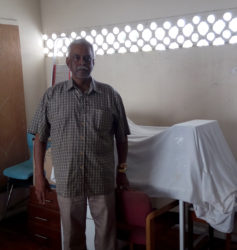Commissioner of Information Charles Ramson SC strongly believes that efforts are being made to frustrate his work even as he has vowed that he will continue to function and will resist any attempt to force him out of office.
Despite the lack of staff, stationery, equipment and a proper office, Ramson says he is still engaging members of the public and organizations. Ramson, a three-time Attorney General and Minister of Legal Affairs, has also accused Prime Minister Moses Nagamootoo of putting a “spin” on what is contained in the Access to Information Act to conceal his own dereliction of duty.
Ramson, during a recent interview with Sunday Stabroek at his temporary office located at his East Street property, insists that the Act states that it is Nagamootoo, as the Minister of Information, who has to prepare an end-of-year report and submit same to the National Assembly, not him.

Within the last few months, he has been repeatedly accused of failing to fulfil his duties but has opted to stay silent. The most recent criticism came in a recent newspaper interview in which Nagamootoo said Ramson had apparently failed to submit the annual report and questioned what work he was currently doing.
Ramson, during the interview with this newspaper, responded to Nagamootoo, saying that he was not accountable to him and that the minister was not his “boss.”
While making reference to parts of the newspaper article, he quoted several sections of the Act which he said contradicted Nagamootoo’s comments. He said the Prime Minister’s comments clearly show that he doesn’t know what the Act stated.
“I don’t have to submit a report to him. He is not my boss. He gotta prepare the report…he admits it in his own thing [the newspaper article] but he is trying to throw the blame on me because he is a spin doctor,” he said, while adding that out of courtesy he can do the report but the Act does not delegate this responsibility to him.
He quoted Section 44 of the Act to support his position. It reads: “(1) The Minister shall as soon as practicable but not later than nine months, after the end of each year, lay a report on the operation of this Act in the National Assembly.

(2) Each responsible Minister shall, in relation to the public authorities responsibility for which has been assigned to him, furnish to the Minister such information as he requires for the purpose of the preparation of any report under this section and shall comply with any prescribed requirements concerning the furnishing of that information and the keeping of records for the purposes of this section.”
Ramson stressed that Nagamootoo is also a “responsible minister.”
Part 3 of this Section outlines what the report is expected to contain. “A report under this section shall include in respect of the year to which the report relates the following- (a) the number of requests made to the Commissioner of Information; (b) the number of decisions that an applicant was not entitled to access to a document pursuant to a request, the provisions of this Act under which these decisions were made and the number of times each provision was invoked; (c) the number of applications for judicial review of decisions under this Act and the outcome of those applications; (d) the number of complaints made to the Commissioner of Information with respect to the operation of this Act and the nature of those complaints; (e) the number of notices served upon the Commissioner of Information under section 11(1) and the number of decisions by the Commissioner of Information which were adverse to the person’s claim; (f) particulars of any disciplinary action taken against any officer in respect of the administration of this Act; (g) the amount of fees collected by the Commissioner of Information under this Act; (h) particulars of any reading room or other facility including official websites provided by each public authority for use by applicants or members of the public; (i) any other facts which indicate an effort by public authorities to administer and implement the spirit and intention of this Act,” it adds.
Ramson said that though he has “boundless” authority he was accountable to the court. He also said that despite all that is being done, he cannot be removed from office as government will have no legs no stand on.
This is addressed in Section 6 (I), which states that “The President may remove the Commissioner of Information from office if the Commissioner of Information (a) is adjudged an insolvent; (b) has been convicted of an offence which involves moral turpitude; (c) is unfit to continue in office by reason of infirmity of mind or body; or (d) had, or has, acquired such financial or other interest as is likely to affect prejudicially his functions as Commissioner of Information.”
It goes on to state that before an effort is made to remove the office holder, the Commissioner of Information must be given an opportunity to make representation.
Difficulties
Noting that he disliked the idea of venting his feelings about this matter in public, Ramson said that he began experiencing difficulties after the government changed in May, 2015. This included him being subjected to a security check at the gate at the Ministry of the Presidency, which resulted in him having to exit his vehicle and be scanned before he could proceed into the compound. He said too that the spot allocated for him to park his car was forcibly taken over.
Ramson said that following his appointment in July, 2013 by then president Donald Ramotar, he was given three rooms to occupy at the then Office of the President.
When the new government took office, there was talk of relocation of his office and he, therefore, volunteered his East Street property as a temporary office for three months, ending December, 2015, until proper accommodation could be found. No accommodation has been found and he has since sued the government for payment for the use of his property as a temporary office over the last year.
Ramson told this newspaper that to date he has no staff and is still at the East Street location, which is very unsuitable. He showed this newspaper his chairs, bookshelves filled with books and a computer desk with a computer which are all being stored in a room on the ground floor. He said because of the dust, he had to cover up the computer.
He also said that it was agreed that a security guard would be placed at the location at nights. However, there is none and he was forced to board up the guard hut because persons were utilizing it for their own purposes.
According to Ramson, he had written to Minister of State Joseph Harmon extensively about his accommodation issues with little satisfaction and in each of the letters it was indicated that he had to seek outside sources to prepare the correspondence since he had no staff to do such. Ramson, who was sitting at a desk in the upper flat of the property, also shared with this newspaper about a dozen letters between him and Harmon over the matter. He also shared letters between him and Nagamootoo.
Ramson, quoting the Act, said it was the minister (Nagamootoo) who is responsible for outfitting him with staff and ensuring that budgetary allocations are made for him. “Is not me falling down on the job, is them,” he stressed.
Doing work
Asked if he has been doing work from the location, he responded in the affirmative, saying that he had about 15 requests for information. Asked where he would accommodate persons if they visited, he said he would speak with them in the room where his furniture and computer are stored or they would be invited upstairs. He said that he can be found at the location every workday from 7 am to 4 pm.
He informed too that several organizations have made contact with him, inclusive of the Private Sector Commission, which requested information about the planned city parking meters. He said that though he invited them to visit the office to further discuss the issue, representatives never showed up. According to Ramson, he has had several applications from organizations, inclusive of the Transparency Institute of Guyana Incorporated and Red Thread, but he was unable to respond owing to the lack of a staff.
He said he was also in need of a webmaster to create a website so that he can upload information that can be accessed by the public.
His duties are outlined in Section 7 of the Act. It states, “The Commissioner of Information has the power to – (a) require a public authority to take any steps as may be necessary to secure compliance with the provisions of this Act, including- (i) by providing access to information, if so requested, in a particular form; (ii) by publishing certain information or categories of information, that are needed urgently and are not published under any other provision of this Act; (iii) by making necessary changes to its practices in relation to the maintenance, classification, management, retention and destruction of records; (iv) by enhancing the provision of training on the right to information for its officials; (v) by providing the Minister with an annual report; (b) require a public authority to compensate the complainant for inconvenience suffered; (c) request and examine any disciplinary action taken against any officer in respect of the administration of this Act; (d) indicate efforts by the public authorities to administer and implement the spirit and intention of this Act; (e) make recommendations for reform, including recommendations in respect of the particular public authorities, for the development, improvement, modernisation, reform or amendment to this Act or other legislation or the common law; or (f) address any other matter relevant for operationalizing the right to access to information.”









